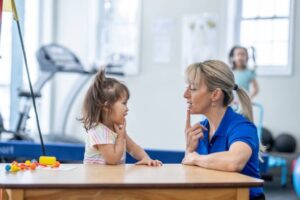For families of children with speech and language disorders, accessing quality healthcare services is challenging. This is especially true for rural and remote communities where specialist services are scarce.
Long waitlists for telehealth services mean many parents, including those with NDIS funding, are missing out. The good news is that technology offers new opportunities. For more experienced speech pathologist Adelaide, check this out.
Alison Spurr
 Alison is a Speech Pathologist who specialises in paediatric communication and swallowing problems. She has a warm and empathetic manner that connects well with children of all ages. Her skills in Hanen ensure that children are engaged during sessions and have fun while learning to overcome their speech and language difficulties or delays.
Alison is a Speech Pathologist who specialises in paediatric communication and swallowing problems. She has a warm and empathetic manner that connects well with children of all ages. Her skills in Hanen ensure that children are engaged during sessions and have fun while learning to overcome their speech and language difficulties or delays.
She has experience in acute hospital settings and community NDIS work. Alison also has specialised skills in complex swallowing disorders and works closely with dietitians to implement texture-modified diets for people with dysphagia.
Leila is completing her Master of Speech Pathology and a Bachelor’s in Psychological Science at Flinders University. She has extensive experience working with young children in various settings and is passionate about providing therapy for the whole family. Leila is keen to explore the broad world of adult rehabilitation and looks forward to building her knowledge in Therapy for Aphasia, Dysphagia and Augmentative & and Alternative Communication.
Kyra Bates
Kyra has a passion for working with children and their families and tackling the behind-the-scenes admin to ensure clients receive the treatment they deserve. After ten years as an Early Childhood Educator, she is excited to broaden her skills in the Allied Health sector. For more experienced speech pathologist Adelaide, check this out.
Speech pathologists are qualified to assess and treat various communication and swallowing disorders in children, adolescents, adults and the elderly. Children who struggle with articulation and phonology (the way sounds are put together to make words) will significantly improve after therapy sessions.
Dysphagia therapy is specialised care and can only be provided by Speech Pathologists who are trained in developing person-centred dysphagia management plans. This includes working alongside dietitians to implement texture-modified diets and fluids.
Laura holds a Master of Speech Pathology from Flinders University and is passionate about working with people to help them reach their goals. She has experience in rehabilitation, community NDIS work, and acute and intensive hospital care. She has a particular interest in traumatic brain injury and the treatment of complex dysphagia. She also has extensive knowledge of managing head and neck cancer-related communication and swallowing difficulties.
Leila Brown
Chloe Brown is an experienced and compassionate speech pathologist who loves working with clients across the continuum of care. She works with paediatrics and adults in various settings and is passionate about excellence in clinical practice, teaching and research. She also has a strong interest in neurological conditions such as aphasia and dysphagia management. She uses a holistic approach and works with clients to achieve functional and meaningful outcomes. She has completed training in the Guardian Way NMES treatment for dysphagia and the Lee Silverman Vocal Technique. For more experienced speech pathologist Adelaide, check this out.
She has experience providing therapy via video link with Umbo, which includes access to professional clinical services from the comfort and familiarity of home. She enjoys exploring rural and regional Australia in her van in her spare time.
What Does a Speech-Language Pathologist Do?
Speech-Language Pathologists (SLPs) are medical professionals who assess and treat communication and swallowing disorders. They work with children and adults in various settings, including private practices, hospitals, and community health centres. They are also able to provide services in the home. SLPs have a potent mix of qualifications, career experience and skills.
SLPs can diagnose and treat a wide range of disorders affecting their clients’ speech, language, communication and feeding. These include:
The most common problem SLPs are trained to treat is articulation and phonology, which involves words’ sounds and how they are formed. Other areas of expertise include:
A good SLP is compassionate and can help their clients reach their full communication potential. They can work with clients to determine their goals and support them through a tailored treatment plan. SLPs may also provide counselling and education to their clients, families, and carers.
